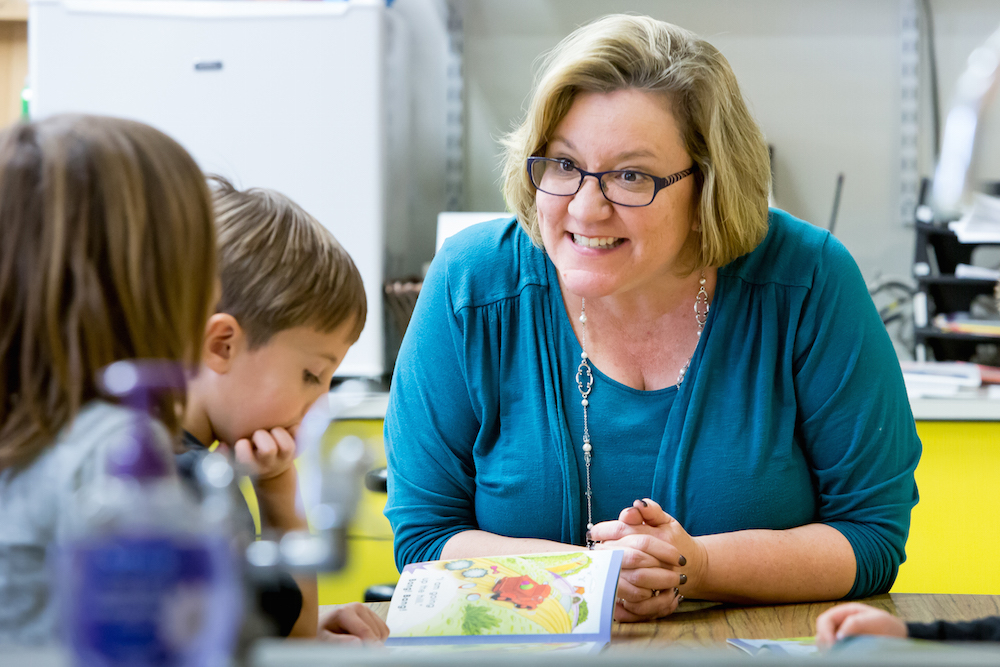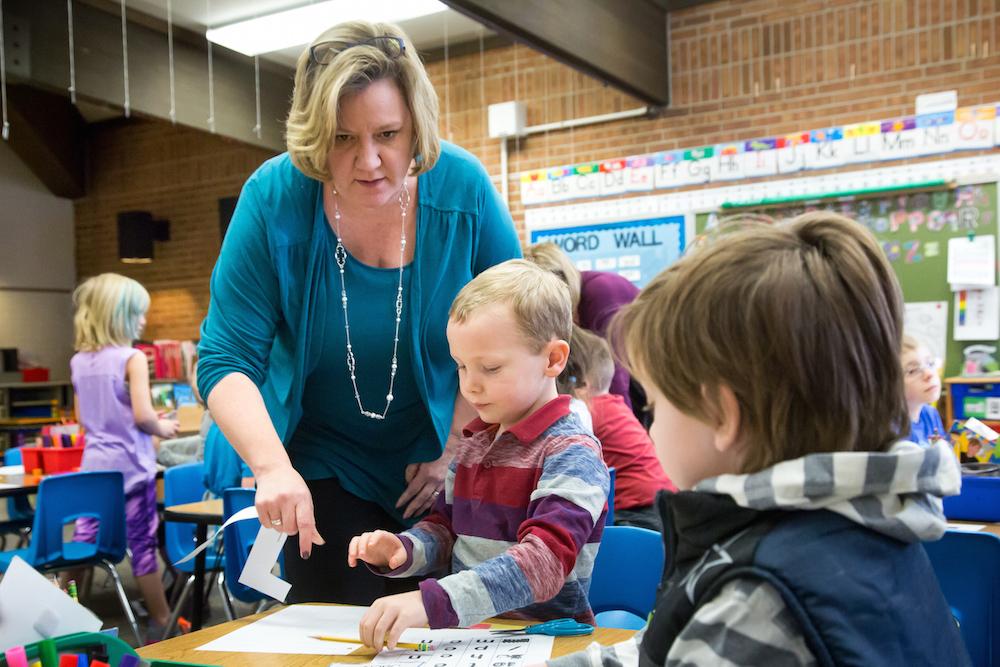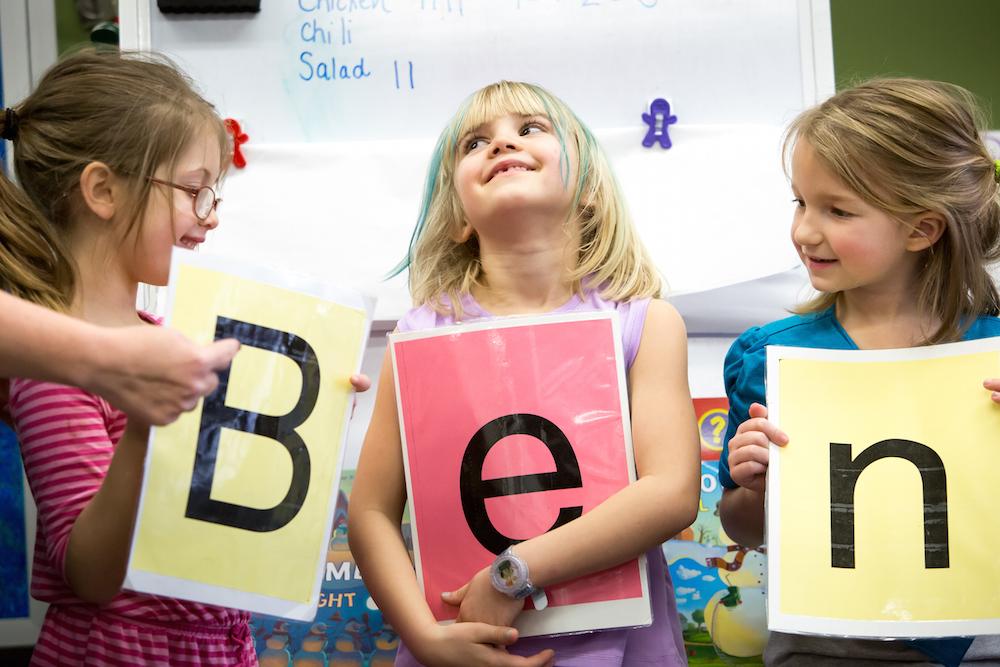Twain’s Jackie Brotherton Helps The Littlest Learners Find Their Way
Twain’s Jackie Brotherton Helps The Littlest Learners Find Their Way

“Crisscross applesauce” is kinder-speak for sitting cross-legged, and Jackie Brotherton is fluent in such phrases – including a class favorite, “1-2-3, look at me; 1-2, my eyes on you.” Brotherton is the beloved kindergarten teacher at Mark Twain Elementary School, who teaches everything from reading and math to the correct way to use scissors and glue and how to line up correctly for lunch or recess. She fixes the occasional ‘boo-boo’ and creates a safe environment so that these young students can learn the ways of school.
“I love kindergarten and it feels like home to me. It’s the place I’ve always wanted to land,” said Brotherton, who currently teaches both morning and afternoon kindergarten with a combined roster of 34 students. “I really have a heart for young children. I don’t talk down to them, and I really enjoy them and have fun with them – that makes learning more engaging for them and makes teaching more engaging for me. I totally enjoy my day!”
Since kindergarten is a critical link between early childhood care and the structure of elementary school, the kindergarten year requires special teaching knowledge and skills from the teacher. That’s why kindergarten teachers like Brotherton are among the most important educators a young child can have during their school years.
Brotherton has been the first teacher for hundreds of LPS students as they enter the public education system. She began teaching at Twain in 2001, and has an undergraduate degree in Behavioral Sciences from Metro State and a Masters degree in Curriculum, Instruction and Assessment from Walden University. While she had stints teaching in first and second grade classrooms, she prefers the challenge of helping kindergartners as they are introduced to school.
“On that first day of school, some kindergartners come through the door having never been to preschool, so the school environment is brand new to them. Then you have kids who have been to preschool or maybe daycare and they have more of those schoolroom behaviors in place. That’s what the beginning of the year is about – making sure we can get everybody on the same page in terms of learning behaviors so we can teach them,” said Brotherton.
“The first behaviors we teach are little things like finding your spot on the carpet and then sitting ‘crisscross applesauce!’” With a laugh, she added, “That’s our first skill! Then we practice raising our hands when they want to say something – and they all want to say something every day, all day long – so taking turns is a big learning skill we teach. That way we have one voice talking at a time.”

Amy Gamber, a Twain kindergarten parent, raves about Brotherton’s teaching style. “I could go on and on about how wonderful Mrs. Brotherton is, but basically she is like a mother away from home for our kids. She has a great understanding of them. She makes them feel comfortable, safe and warm,” said Gamber. “That’s what you want in kindergarten. You aren’t bringing a student to kindergarten, you are bringing your baby, and she’s the perfect extension of what the kids are getting at home.”
One of the biggest challenges for a kindergartner is separation anxiety – an issue Brotherton takes seriously and handles gently. Gamber’s son Zane, 5, was excited about his recent turn (“It was fun!”) as the weekend caretaker of Chester the Raccoon – a classroom puppet that Brotherton uses to help students deal with the fear of being away from their families. Chester is a character from The Kissing Hand, written by Audrey Penn. The book features a mother raccoon comforting her child raccoon – Chester – by kissing the center of his hand and telling him, “Whenever you feel lonely and need a little loving from home, just press your hand to your cheek and think, ‘Mommy loves you. Mommy loves you.’” Students take turns caring for Chester at their homes to reinforce the storyline. They write stories and take photos of Chester and his adventures while in their keep.
“These little ones need so much hand-holding when they come in the door that first day, so we work to help manage those fears,” said Brotherton. “When they leave nine months later, they are little adults ready to be successful at the next grade level. It feels so good to be part of that growth and confidence.”
Mark Twain Principal Dr. David Hilliard sees the passion that Brotherton has for her job and said he believes that she is “the perfect kindergarten teacher.” He elaborated on some of the qualities he believes make her so effective: “She’s calm, patient, creative, flexible, sincere and high energy, and her persona invites you in and makes you feel welcome and included.” Dr. Hilliard also said, "Sometimes I've heard individuals say – ‘It's just kindergarten.’ That always surprises me because teaching kindergarten is a real challenge. It's a very complex environment. Kindergarten teachers like Ms. Brotherton have a profound impact on children's lives and prepare them for continuing success in school and life"
To keep up with a classroom of five year-olds every day takes a lot of energy, but Brotherton uses their presence to recharge daily. “When I’m having a low energy morning, as soon as they walk into the room – it’s the love I feel right then that keeps me motivated. Just dealing with those little people and their challenges, the joys and celebrations they bring everyday – it’s just naturally motivating to me.”

Brotherton also draws on her colleagues for ideas and support. “Twice a month school will start late on a Wednesday and that’s when Twain teachers meet to look at student data benchmarks and discuss instructional strategies. We expect every child to achieve, and we work together in our Professional Learning Communities (PLCs) to ensure each child’s success. I know it’s a lot for families to schedule these late start days, but the PLC time is invaluable. I’m a better teacher because of these opportunities to collaborate with colleagues and focus on student learning.”
Students are eligible for Littleton Public Schools kindergarten if they turn five years of age on or before October 1 of the year of enrollment. Kindergarten registration will be held at each LPS elementary school on January 30 and 31, 2017. Parents can register their kindergartner by completing an online pre-registration form and visiting their local school.
With kindergarten registration coming soon, Brotherton shared her tips for what parents can do to help their kids be better prepared for kindergarten success:
- Read, read, read to them. Make reading a fun and enjoyable experience that they associate with loving and positive feelings. Let them see you reading for enjoyment as well.
- Help them work on mastering some life skills like tying their shoes, zipping jackets and backpacks and keeping track of their things.
- Talk about the things you see and experience together. Research shows that kindergarteners who come to school with a lack of appropriate vocabulary are at a significant academic disadvantage.
- Sing songs! Music is a wonderful teaching tool. Learn the ‘ABCs’, sing silly songs and nursery rhymes.
- Limit technology time, but don't eliminate it all together. Some of the testing that is done is on the computer and a child who has some basic mouse skills can handle the assessments better than those who are learning how to navigate the technology for the first time.
- Encourage their emerging literacy skills and their attempts at written communication. Taking those risks is a big step in developing literacy.
- Take them to play at the park or make sure they have time on the swing set in the back yard. Large motor skills and the hand strength that develop are critical to brain development and are a pre-cursor to fine motor strength and coordination.
- Lastly, find fun things to count together, like the steps to the kitchen or the number of yellow cars in traffic. Helping them to locate and identify shapes in their world in addition to sorting, classifying and playing simple board games together will provide a great foundation for number sense and other mathematical concepts that are essential to mathematical fluency.
Today’s kindergarten is not the kindergarten of 10 years ago, and the expectations and standards are challenging for these young students. When parents come to the classroom door at the end of the day to pick up their kids, the first thing they ask is, “how was your day?” At Mark Twain Elementary, the answers usually come with big smiles and happy faces, courtesy of Jackie Brotherton’s presence in their lives.
Article and photographs courtesy of Bill Youmans.
